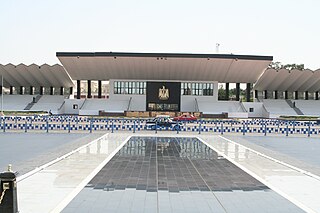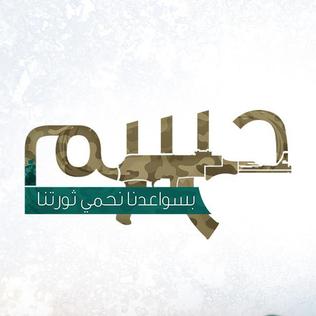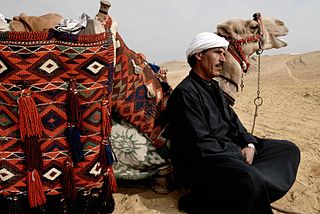
The 2004 Sinai bombings were three bomb attacks targeting tourist hotels in the Sinai Peninsula, Egypt, on 7 October 2004. The attacks left 34 people dead and 171 injured.
Multiple terrorist attacks have occurred in Greece.

Terrorism in Egypt in the 20th and 21st centuries has targeted the Egyptian government officials, Egyptian police and Egyptian army members, tourists, Sufi Mosques and the Christian minority. Many attacks have been linked to Islamic extremism, and terrorism increased in the 1990s when the Islamist movement al-Gama'a al-Islamiyya targeted high-level political leaders and killed hundreds – including civilians – in its pursuit of implementing traditional Sharia law in Egypt.

The Abdullah Azzam Brigades, or al-Qaeda in Lebanon, is a Sunni Islamist militant group, and al-Qaeda's branch in Lebanon. The group, which began operating in 2009, was founded by Saudi Saleh Al-Qaraawi and has networks in various countries, mainly in Egypt, Iraq, Syria, Jordan, the Gaza Strip and Lebanon.
Jamaat Ahle Sunnat is a Muslim religious organization in Pakistan that represents the Barelvi movement. It is supported by Mashaikh including all spiritual centers. As a Sunni organisation it has adopted many Sufi customs and traditions. Jamaat e Ahle Sunnat is a representative of sunni(sufi) nation of Pakistan. It works under the superivision of spiritual centers including Golra Sharif, Sial Sharif, Pakpattan Sharif, AliPur Syedan Sharif and others. Pir of Golra Sharif is the current pattern in chief of the organization.

The Sinai insurgency was an insurgency in the Sinai Peninsula, Egypt, that was commenced by Islamist militants against Egyptian security forces, which have also included attacks on civilians. The insurgency began during the Egyptian Crisis, during which the longtime Egyptian president Hosni Mubarak was overthrown in the 2011 Egyptian revolution.

Protests against the 2013 Egyptian coup d'état erupted in July 2013. Immediately following the removal of President Mohamed Morsi by the Egyptian Armed Forces on 3 July 2013 amid demonstrations against Morsi's rule, many protesters amassed near the Rabia Al-Adawiya Mosque to call for Morsi's return to power and condemn the military, while others demonstrated in support of the military and interim government. Deadly clashes such as Rabaa massacre continued for several days, with three particularly bloody incidents being described by officials as "massacres" perpetrated by security forces. During the month of Ramadan, prime minister Hazem al-Beblawy threatened to disperse the ongoing Pro-Morsi sit-ins in Rabaa al-Adaweya square and al-Nahda square. The government crackdown of these protests occurred in a violent dispersal on 14 August 2013. In mid-August, the violence directed by the army towards the protesters escalated, with hundreds killed, and the government declaring a month-long nighttime curfew.

Ansar Bait al-Maqdis, or Ansar Al-Quds, was a jihadist, extremist terrorist group based in Sinai from 2011-14.

The December 2013 Mansoura bombing occurred on the morning of Tuesday, 24 December 2013 in the Nile Delta city of Mansoura in Egypt. The target was the city's security directorate building that was partially collapsed after the attack. At least 16 people were killed, mostly policemen, while more than a hundred were injured, according to the Ministry of Interior. No one immediately claimed responsibility for the bombing but Prime Minister Hazem Al Beblawi, on behalf of the interim government, was quick to blame the Muslim Brotherhood of being behind the attack, labeling it a "terrorist organization" for the first time since the ouster of Mohamed Morsi on 3 July earlier this year. Egyptian authorities also stated that the militants received logistical support from Hamas. Ansar Bait al-Maqdis, an Al-Qaeda-linked group in the Sinai Peninsula, released an online statement claiming responsibility for the blast but the government sounded determined that the Muslim Brotherhood was behind it and intensified its crackdown on the organization. The incident is now widely believed by many to be a turning point in the nation's history as the future of both the Islamists and Egypt's stability remain shadowed and unclear with several violent clashes and other bombings taking place across the country following its ban.
On 24 and 25 January 2014 a series of bombs exploded in Greater Cairo. The first four explosions occurred on the day before the anniversary of the Egyptian Revolution of 2011, with the fifth coming on the anniversary itself.
The Kerdasa massacre refers to the killing of twelve Egyptian security personnel in August 2013 in Kerdasa's main police station, a town in Giza.
The raid on Kerdasa took place on September 19, 2013, in Kerdasa when Egyptian security forces stormed the town to cleanse it from alleged terrorist spots. The operation was in response to an earlier massacre on August 14 the same year, where protesters attacked a police station killing eleven security personnel shortly after the Egyptian security forces had launched a violent crackdown and massacre on two protest camps in Cairo where hundreds of supporters of ousted Egyptian president Mohamed Morsi were killed. The raid came a few days after a similar operation in Minya's town of Dalga, and was part of a larger crackdown by the interim government on armed supporters of deposed President Mohamed Morsi.
The following lists events from 2014 in Egypt.

Jaish ul-Adl, or Jaish al-Adl, is a Sunni militant and Baluchi separatist organization that operates mainly in southeastern Iran, where there is a substantial concentration of Sunni Baluchis and a porous border with Pakistan.

The Insurgency in Meghalaya is a frozen armed conflict between India and a number of separatist rebel groups which was taking place in the state of Meghalaya. The Insurgency in Meghalaya is part of the wider Insurgency in Northeast India, and was fueled by demands of the Khasi, Synteng and Garo people for a separate state.
The following is a chronological timeline of fatal incidents during the ongoing Sinai insurgency, which was invigorated by a period of relative instability and political turmoil in Egypt, beginning with the 2011 uprising against former autocrat Hosni Mubarak. Insurgent attacks, however, intensified significantly following the July 2013 coup that ousted Muslim Brotherhood-backed president Mohamed Morsi and subsequent crackdown on his supporters.

In July 2013, at the same time as mass protests began against the 3 July coup d'état which deposed Mohamed Morsi, and in parallel with the escalation of the already ongoing jihadist insurgency in the Sinai Peninsula, pro-Muslim Brotherhood militants started violent attacks against policemen and soldiers in central and western Egypt. In the following months, new Islamist armed groups were created to reinstate Islamist rule in Egypt, like Soldiers of Egypt and the Popular Resistance Movement. Since 2013, violence in mainland Egypt has escalated and developed into a low-level Islamist insurgency against the Egyptian government.

The Arms of Egypt Movement, commonly known as the Hasm Movement, is an Islamist militant group operating in Egypt.

Terrorism and tourism in Egypt is when terrorist attacks are specifically aimed at Egypt's tourists. These attacks often end in fatalities and injuries and have an immediate and sometimes lasting effect on the industry. Attacks take many forms; blowing up an airplane carrying tourists, drive-by shootings of tourists, knife attacks on tourists and suicide bombings in a location where tourists are congregated. On the timeline of these events, the 1997 Luxor Massacre stands out - 62 tourists were ambushed and killed.











